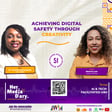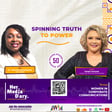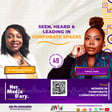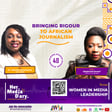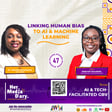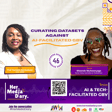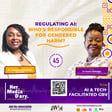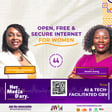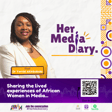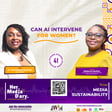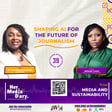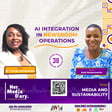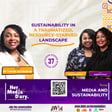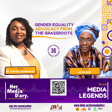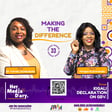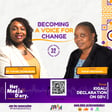Challenges for Women in Media Leadership
00:00:05
Speaker
know in here our community is more satisfactory and um they like you staying at home rather than working that is we do have a lot of reporters and presenters but when it comes to women leadership it's not easy when man john is new media house they train him the camera the dating of the technical as women They assume like she's weak.
00:00:31
Speaker
The only thing that she can do is the entertainment programs, advertisement, presenters, women program issues. They decide for you what you can do.
Introduction to Her Media Diary Podcast
00:00:55
Speaker
a world where we have gender equality and equity in and through media. This is our mission at African Women in Media. I'm Dr. Yemisi Akimbo Bola and this is Her Media Diary, a podcast that captures the lived experiences of African women working in media industries.
00:01:12
Speaker
In this episode, I'm joined by Hinda Mahamud, the chief editor of Bilan Media, Somalia's first all-women media team.
Bilan Media: Overlooked Issues in Somalia
00:01:22
Speaker
Hinda leads a team dedicated to covering social issues often overlooked by traditional media in Somalia, such as climate change, people living with albinism and HIV AIDS, and period education for young girls.
00:01:37
Speaker
She shares the challenges faced by female journalists in Somalia, including societal norms that discourage women's leadership. Yet, she remains optimistic about the future, believing that the existence of Bilan Media shows the community that women can lead and succeed in journalism.
00:01:55
Speaker
So throughout this series, we'll be in conversation with African women who have made a name for themselves by holding vital leadership positions in various newsrooms. By inviting these voices into conversation, we hope to provide solutions to break down barriers faced by African women.
Hinda Mahamud's Journey to Journalism
00:02:22
Speaker
So Hind, it's such a pleasure to have you on the podcast. I remember in our 2023 magazine, we did a special on your organization, Bilan, which is an inspirational read. i mean, you're yourself an inspirational woman. i You're an author and a chief editor of Bilan Media, which is Somalia's first all-female media team. And, you know, lots of media international media have covered your story and the story of your platform.
00:02:48
Speaker
And what we're trying to do on the podcast here is to get to know the story behind the story, right? um So it's really great to hear your journey and, you know, how it started for you.
00:02:59
Speaker
right from the earliest age. um Thank you for inviting me to this platform. Let me just give you bit introduction about villain media. As you know, as you mentioned, that's all female media team.
Pioneering All-Women Media in Somalia
00:03:13
Speaker
We are basically in Mogadishu. We do report news and future stories of other countries. We go to the regions to report on stories.
00:03:24
Speaker
And it is the first time women have been in charge of the news agenda. and We choose the topics that we want to report. And also we do the research, we do the writing, thing we do the filming.
00:03:37
Speaker
it's like from the button to the finishing line. So it's the first time that women getting that chance to, in in the media of Somalia. And also we are transforming the Somali media landscape by giving women safe space and really tutorial that they can have their own choice.
00:03:54
Speaker
Yeah, so um apart from that, when I started journalism, leadership was even right now,
00:04:05
Speaker
ah were majority dominated by man. If you want to get that position, you have to work twice as hard to prove yourself.
00:04:16
Speaker
Absolutely. Even right now. So there was lack of also mentorship and still it's existed that issue. You cannot see like women who is yeah who can mentor us in media or as a journalist in Somalia. But we will get that, inshallah.
00:04:33
Speaker
but um But if you want to also lead a position, you have to push through by focusing on also your skills and advocating for a lot of women to be in the decision-making position so so that other female also can get a in that position.
Influences and Early Media Career
00:04:52
Speaker
Yeah. So, but let's let's take a few steps back. Did you grow up in Mogadishu? and No, I grew up in Hargeysa. I was born in Chikchigaba, I grew up in Hargeysa. After when I graduated from the university, I came to Mogadishu.
00:05:07
Speaker
um I have been in Mokadish right now for years and this is my fifth year. Okay. So tell me about growing up in, please pronounce the name of your town again.
00:05:20
Speaker
Aksha? Hargeysa. Hargeysa. Brilliant. So which part of smile Somalia is that and how what was it like growing up there? im Growing up there, it was where i I get from the courage.
00:05:37
Speaker
And it made me the woman that I am today. And I went to do a diploma of journalism. I used to love writing and also listening to the radio.
00:05:49
Speaker
So when I was a teenager, I was like, I need to be more formal so that I can also start journalism. So I started school in a college that I did one year and half of diploma. And then that's when I joined to the industry of media.
00:06:06
Speaker
I started with Tifi, which was a local Tifi. At that time, I wanted to learn the technical side. But Inda, let's really talk more about your childhood. Like, what was it like growing up in your town? was your family setting, you know?
00:06:24
Speaker
Tell us a bit more about you beyond before you became a journalist. what's What's your earliest memory? So as a kid, I used to act as an old person because I grew up with my grandma.
00:06:37
Speaker
So I used to like listening to radio. Every morning there was a radio call, Radio Hargeisa morning show. I used to listen before I go to the to the traditional school, which we call in here Madrasa.
00:06:53
Speaker
So um every 7 p.m. they used to start that show and I have to listen that show. And always I have to be late because I was listening to that show. And my mom used tell me, you have to go to this school.
00:07:06
Speaker
Because like um I used to like listening a lot. I used to also play a lot. But Writing was something that I like i used to like. um I used to write my daily activities, um even though as a young age in Somalia, it's rare to see someone who is, yeah,
00:07:27
Speaker
at a young age, starting writing and also listening to, focusing on more into, you know, news and shows. And also in the afternoon is on at around 2 PM. I used to listen the same radio and BBC,
00:07:46
Speaker
I used to listen, um they used to have different songs. That was a show they called Dorwanaksen, which is like um um Good Afternoon. So I used to listen that show also. um And I had to choose because they used to have songs that they used to, that you can ah choose.
00:08:06
Speaker
So I used to choose um songs from that show. In here, lot of the kids, you know, they take a nap, but I didn't like taking nights. So I used to, I have to listen to the BBC radio.
00:08:23
Speaker
And then I was playful kid when I was young. You talked about growing up with your grandma. Tell me about your grandma and influence she had on you. and My grandma, I do remember the things that is she tells me um when I was young, um around one year and something.
00:08:41
Speaker
We used to live in in Somali region in Ethiopia. So there was a war that happened in that area in Chikichika. So my my family had to flee from that area. and So they went to deep on the in Ethiopia and other you know ethnicities.
00:09:01
Speaker
So as a kid, you know like when you are young, you are playing with the other kids. So I was catching from the other ah kids from their language and I was starting to learn another language, the Etopian language.
00:09:15
Speaker
And no my grandma at that time came to visit my mom and she told me that I am not speaking Somali and I was starting to speak another language and she was like, I need to take my granddaughter so that she can learn Somali.
00:09:33
Speaker
And then she took me to, ah to with her and we came to where my family side of my man live at that time. So she saved my language.
00:09:46
Speaker
I don't think that I can speak the Somal that I can speak right now and the Somal that I am writing. Another language was becoming my first language. So she saved me from that. um After a few years, um two or three years, I think, um We fled from Chik'chik and then we came to we moved to Hargeysa.
00:10:08
Speaker
um There was a gap that my grandma didn't come Hargeysa with us, but stayed with my mom and my young siblings.
00:10:20
Speaker
But that is a deep connection with my grandma. I always call her like, ah you know, even though she's my mom, but when I grew up, ah like seeing when I was younger, her on every day in my life, i I would say like, she's my mom. And my mom, my real mom was like my second mom.
00:10:40
Speaker
So yeah, that's a deep connection with me. um I love my, actually, I love my grandma. yeah No, we we have that in common, actually, because I also lived with my grandma for the first two years of my life. And we, I mean, she's, she's not long, she's no longer with us.
00:10:56
Speaker
But so I still have a very deep connection with us. I perfectly understand that. You talked about fleeing. and Tell me about that. What's your memory of that period? of that conflict period and your fleeing?
00:11:09
Speaker
um ah The war happened in Chikshiga at that time. a lot of ethnicity, the Somali region, the Somali community who live in that that area um was fighting with the government of Ethiopia, with the ownership of the of the land.
00:11:26
Speaker
I don't have much memory because I was very young at that age, of like one year and have something when my family fleeing from that. and went to the other community. So, and then like when I, when my grandma took me to to my family side of my mom, then we came to Hargeisa. So we, I didn't go back until 2020, 2020, four years old. Yeah. So I don't have much memory about that, but the thing was, it was about ownership.
00:12:02
Speaker
They were, they were fighting ah So you've mentioned radio quite a few times. So radio seems to have quite an influential impact on your journey into journalism. Tell me more about that.
00:12:13
Speaker
um Actually, I think where I i had developed the skill of listening is when I started listening to radio. Till now I listen a lot.
00:12:25
Speaker
listening to podcasts, listening to documentaries, listening to audio books, it's where developed from. And also from that ah skill, I mean, listening to the radio also, it gave me to listen also people when they are talking to me because Listening is something that can give you understanding the people. And also then when you understand the people, you know how you can respond to them and what you can from them. So it's radio is radio was um where I developed my listening skills and I still like, even if I am um on the road,
00:13:06
Speaker
cooking something, cleaning something, writing something. I am always listening. So people tell me like, why you listening? Things you are working. So I say like, I am not focused listening, but I need something that's talking beside me.
00:13:20
Speaker
I need that. So it's ah where I develop my listening skill, I can say. And so you also talked about kind of and studying journalism or studying media. what Was there a journalism course at that time? And what was it like studying m At that period. In Hargeisa, it was hard to... You can get diploma of journalism, but it was hard to get degree or the higher education.
00:13:49
Speaker
So at that time, the only thing that I had to do and get the opportunity to do was to learn as a diploma. And when I was starting the university, I looked for that course to do like journalism, but I didn't you get that course.
00:14:07
Speaker
So I did international relations and diplomacy, which is kind of... more focusing on diversity and international relations.
00:14:17
Speaker
And someone who is a journalist needs to understand what's happening around the world and the policies, the history of and all of those things and the history.
00:14:31
Speaker
and And so tell us about your journey towards Bilan Media with this organization that's gotten to such global attention. and and kind of your leadership of it? How did you journey towards Bilan Media?
Transition to Leadership at Bilan Media
00:14:45
Speaker
Actually, i was in Mogadishu at that time and i had I was working at that time before I joined Bilan, I was working projects which was about the elections and women's representation.
00:14:59
Speaker
because that is another skill that I also developed from the university, which was the research. Within in my university, I was also working on research programs.
00:15:13
Speaker
So at that time also, i yeah, I was working as an ob observer. So um I had a lot, they launched the project of Beline Media and I didn't get the chance to join in when they were launching the program.
00:15:29
Speaker
But after seven months, they advertised a position and that's when I applied to Bidon and I joined the US and staff. So you mentioned earlier on about being a leader in media industries and especially in a country like Somalia, where it's a very male-dominated kind of patriarchal media environment, right? So what has been your journey in taking leadership of a woman-only, a woman-led media organization in an environment like that.
00:16:02
Speaker
You know, in here, women, in the media especially, and in general, you know, our community is conservative and they had that um they like you staying at home rather than working.
00:16:16
Speaker
So also being in the media and also showing your face, writing, speaking, it's something that that we do have a lot of reporters and presenters.
00:16:29
Speaker
But when comes to women leadership, it's not easy. yeah And because of the media owners, the private media owners are men.
Bias and Women's Roles in Somali Media
00:16:41
Speaker
the the only thing that they can think about is to get someone that they believe they can do the work and they don't believe women they can do the work. So they will give the opportunities to to man So, and also, you know, like when man started, or he joined his new TV or new media house, they train him, even if he don't like, they train him the camera, the detail, all of those, you know, the side of ah but side of of the technical.
00:17:19
Speaker
So as women, they assume like this week, la only thing that you can do is the entertainment programs, advertisement, presenters, you know, women program issues.
00:17:37
Speaker
They decide for you what you can do. And also when there is a meeting, they will not ask you what you would like to tell, what would you like to report on.
00:17:49
Speaker
Like, even if there is a position that they nominate to for women, because the things that we see, because when they see that PILAN is only all women media and they can lead each other, that is somehow somehow that they are nominating positions but they will make for you assistant as someone who is man your male counterpart and he's the one who is making the decisions it's kind of like you are in there but like you are not taking the actual sessions so being in media and also being in a leadership position snug is in here
00:18:30
Speaker
And also being someone who can like doing film is documentary is not easy in here as a female in here. So but bien when Billam came into the picture, they can see that women can work together, women can lead, women can do their work by their own.
00:18:50
Speaker
And also the stories that we have been reporting are different from what was actually was reporting on Somalia because only that was only two programs they used to talk about the political issues, security, the conflict is all of those things like.
00:19:10
Speaker
But they didn't focus on the social issues, what's happening behind the scene of of the society. What's happening on the health sector? What's happening on the education sector? What's happening on the women who have been developing small businesses?
00:19:25
Speaker
ah The economy, you know, the security, how how women influence peace building, people who live with HIV AIDS, people who live with Albanism. and period education because there was a ah program that we did, one story, and also we did a talk show about young girls and the period education.
00:19:47
Speaker
So you can see our focus is kind of changing the media landscape into something that they can focus on because Somalia, there's more than that, you know? Yeah.
00:19:58
Speaker
And so, I mean, you've begun to kind of elude on this, but as a female or woman newsroom, What would you say in your experience since you took over as chief editor, what ah do you say the biggest challenges that you face and how have you navigated them?
00:20:14
Speaker
um That's a cultural tradition. um There's a social norms that ah discourage women to take these leadership positions.
00:20:25
Speaker
But as a woman, we... if we I mean, if I don't take that challenge, I don't think the media sector will change. So as women, I have to be role model to the young females who are joining to the industry so that they can also believe if Bill and Tim or Hinda can do this work or if she can help this position,
00:20:50
Speaker
position I can do the same. And also, whenever there's event, when there a program, when that people meet with me, like especially young girls in the universities and the other women who are in the field, um I tell them, like you have to be... like Tell them what you want.
00:21:11
Speaker
if If you don't tell them people what you want, to no one can... Like no one can head inside you and know what you want, you know? So it's like, I'm in this position, but also trying to also advocate for other women also to help other positions, not only in the media, but also in the government side, the private sector, education, health, security, military, police, you know?
Mentorship and Transformation in Media
00:21:42
Speaker
We don't see those. So like we have to also report also those issues, why women are not in that that ah sector. So it's like, but we have to do a lot of work. I know there's a lot of work that two we need to do.
00:21:57
Speaker
um Also, when it comes not only me, but we have we getting with the get opportunity as field and media to mentorship programs and also learning from the other media. We go to Nairobi to learn from the other media. So that is a the other women, they don't get that opportunity. But for me, that's a challenge.
00:22:22
Speaker
If you if you you are not getting mentorship programs, it's not easy to lead and also it's not easy to manage female or other people, you know.
00:22:33
Speaker
So for me, luckily that I'm getting that mentorship and my team also getting that mentorship, but also trying to transform that mentorship from us to the other local women in the media is something that we are also trying to, you know, ah try to indirectly mentor them. And also there's a majority of media are male dominated. So women to promote in leadership positions, it's rare to see.
00:23:06
Speaker
It's rare to see. And for me, sitting with all men leaders in a table will make you uncomfortable if you just if you are the only one How do you navigate that?
00:23:22
Speaker
How do you navigate that when you you are sitting at that table? What has been your experiences? I have to show more than I shouldn't to show, you know, as a woman.
00:23:35
Speaker
Because I am the only one who is representing women. I have to be strong. I have to be more clear. I have to be um ah presentable. i have to be ah I have to be clear on what I am talking about. i have to be someone who is advocating for women. I have to tell them, like, if women are...
00:23:51
Speaker
facing harassment, i have to represent on all of those things. But if I have female counterparts in that position, is and it will be mix of genders, it will be easy. And the heavy thing that I am carrying for being the only woman who is in the media leadership will be left, you know.
00:24:13
Speaker
But right and now I'm the only one. So I have to be like someone who, I have to be so show more whack than what I have to be what I have to argue yeah I'm just trying to imagine how you feel kind of even before you enter that room like talk us through kind of how you're feeling perhaps with your very first meeting with all media leaders in Somalia describe what you went through and what was that like for you There was a program, um it was workshop, and i was all I was the only one who was that at that leadership position.
00:24:54
Speaker
So when they ask like, what position are you held? It's like, I am the editor of something and then they are all men and I am the only one who used is the chief editor.
00:25:06
Speaker
So it was kind quite a disappointment, but I knew that it was ah there was no other woman who is in this position. So when it comes to talking about leadership and what media people need and journalists need, you have to be more but professional and share your responsibilities, the responsibilities that you are representing all the female in this position alongside the societal expectation and the difficulties that you that women are facing and why they are not giving women the opportunity to lead. You know you mentioned earlier on about mentoring um young women.
00:25:57
Speaker
and What has been your experience of mentoring? I don't do actually direct mentoring, but randomly, yeah, randomly, um it's kind of, it's indirect mentoring people.
00:26:11
Speaker
When they see you, held in this position, whenever they see you, they will share with you how, how, was your experience and what they are expecting for the future and what their ambition. So I have to encourage them, like they can do more than i am right now.
00:26:30
Speaker
And I'm the only role model for, we started PILEN, you know, but we are not the last one. So we have to that we have to show that for the female journalists, you know,
00:26:46
Speaker
It's kind of more indirect ah mentoring, showing the team going to the work, doing their work by flexible, knowing that I have a strong team that who is capable, what men also capable of doing ah in in the media when it comes to storytelling. Actually, I have strong team that who can ah do a lot of stories and it's been building the only all-women media team but it's the first media team who won international award and it's the first time so by winning that uh our word also is kind of indirect mentoring because women can reach a lot of positions if they have given theor to the to lead
00:27:37
Speaker
Hi everyone, so permit me to introduce you to the Kigali Declaration, which is a groundbreaking commitment by African women in media to bring gender equality, representation and respect into every newsroom across the continent.
00:27:50
Speaker
By signing up, media organizations are pledging to tackle gender biases, amplify women's voices and create safer spaces, more inclusive workplaces for everyone. Now imagine a media landscape that treats every story with balance and every voice with dignity.
00:28:06
Speaker
By adopting the Kigali Declaration, it's not just a commitment, it's a powerful step towards social change. And that starts with every one of us.
00:28:23
Speaker
absolutely Let's go back to m you now and and kind of your your journey in, because you talked about the kind of stories and that Bilan does and the inspiration behind them.
00:28:35
Speaker
I know that you started writing your first book, and or you wrote your first book, Rad Somali at 20, which looked at the origins of the Somali people. So how did...
00:28:46
Speaker
ah that first book and that process and the things you learned about Somali people, how has that influenced your storytelling and the kind of journalism that you do? ah
Exploring Somali Identity and Women's History
00:28:55
Speaker
First of all, i I used to like reading in story based and history.
00:29:01
Speaker
So a lot of my community, they believe some of them, they are African. Some of them, they believe that they are Arabists. Some of them, they believe something else. Some of them, they believe they are Somalis.
00:29:15
Speaker
So I needed to to learn more about that. And I needed to answer questions that I had in my head. I needed to know more about my people. so I was and reading a lot about my Somali community and their history and their language, all of those things.
00:29:33
Speaker
Then I started writing that book. um Writing that book shaped me in my storytelling to be more in, to share the beauty of Somalis, the beauty of our language, the beauty of our culture, how women Somali women have been contributing to their to their ah community, how Somali women are strong women, and how have they been contributing to their societal, even though the culture is not giving them you know their position. But they have been backbone for the community in history,
00:30:13
Speaker
when they were fighting with the colonial, when they were every every sector of the life women were present. But I learned through that that ah in ah in that book writing that a lot of women who have been contributing to the community have been not written there as a historian. And they only focus on man.
00:30:37
Speaker
You can see, um um They have been written a lot of books from Seyyid, but they have been written about a lot of books from Hawatako, which she was also fighting with the colonians.
00:30:50
Speaker
But it shows you there was always gap You know, there was a gender gap in every sector of life. So I have to focus on more how I can show the beauty and how women also contribute into the life of Somali community. Whenever I go to to programs, whenever I go to those people who write a lot, I ask them, why don't you write about women?
00:31:16
Speaker
Why are you not sharing the story of women, the poetry women who used to sing? Why are you not telling why ah women who have been contributing to the community. But they have been here and there. But it's shame me that I have to be more on responsible women's issues and also hide their narrative.
00:31:37
Speaker
And of course, you've over your career, you've you've covered stories, and on so-called taboo issues like period poverty, climate change. you mentioned albinarism earlier on. What are some of the most challenging stories you've had to report and how do you ensure that your stories lead to impact?
00:31:58
Speaker
um A lot of topics considering here taboo when it comes with the Somali community we like to hide our issues so and people don't like to talk about those issues so yeah it was challenging to share the HIV AIDS stories and also the period education for young girls it's i I mean it's very very abbbs taboo I'm Somali but It's taboo in tabable topic to talk about women being religious issues.
00:32:32
Speaker
But we started doing a story about that one first. It was by lot. Usually what we're doing here, oh it's like if we see some if we see something taboo or topic that people don't like to talk about, we start with the story.
00:32:47
Speaker
And then when we see the story feedback, That's when we start also doing, you know, the talk show, bringing people together that they can also make discussions about that one.
00:32:58
Speaker
So we did a story of video education and we get we were not expecting to receive ah more positive on that issue.
00:33:09
Speaker
But when we were starting, a lot of our male counterparts in the media and other friends that we have, they were saying, like, if you talk about that issue, it will be something that film media will will deal with in a negative way.
Tackling Taboo Subjects in Somalia
00:33:27
Speaker
yeah we have to talk about because as a young girl, when I was young, I didn't think get that chance. And, you know, no one teach me what was period.
00:33:37
Speaker
and And I didn't, you know, like it was something that I needed when I was young. And everyone in every woman in Somalia needed that opportunity. So we started that doing and then we invited the government and we asked them if they are planning to add on the curriculum, are they going to train the teachers?
00:33:58
Speaker
And also we invited the school principals and their contribution of, you know, and school because in in here it's it's hard to stand up and say like, I want to go to, i have my period today.
00:34:13
Speaker
It's not easy. So a lot of the male teachers, they don't understand those issues. Even if they don't, even if they understand, they don't care. So we were asking them, like, what are you as a government doing to this issue to support the young girls when they are having their period?
00:34:32
Speaker
Are you providing the beds? Are you providing the other ah things that women need? But they said they are going to do, they are going to add on the curriculum and they are going to do something about it.
00:34:47
Speaker
And also this year we are planning to do follow-up talk show by knowing what where the government, where that process is going on.
00:34:58
Speaker
So when you think about all the work you've achieved at Berlin and obviously the very male-dominated environment you work in and all the way, the social cultural issues, the conflicts, everything.
Empowering Women and Changing Perceptions
00:35:09
Speaker
what would you say is is the biggest kind of achievement in your eyes that you're making now? And how do you see landscape changing over the next 10 years or five years or two years?
00:35:23
Speaker
The existence of PILAM was successful and and it showed the Somali community that women can, they were they have been contributing to their societal, but it was not showing.
00:35:37
Speaker
But right now, PILAM is showing that we are reporting on stories, women who have been innovating new things women who have been filming women who have been sharing but their political participation wherever there's a sexist women we are showing the community the contribution of women and also it's not only women but the social context So having this will show you that women have been doing a lot, but they have been unheard.
00:36:10
Speaker
So Billion is the voice of the community, but especially for women. And also the second thing that I can see the achievement Billion has achieved, it's like women get to sit on the decision-making table. They choose their own stories. They choose their own angles that they are going to report on.
00:36:32
Speaker
They do have the freedom of sensing the storytelling and telling these stories from their perspective. And also the second thing that I will say is like, also we are changing, we work with the international media.
00:36:49
Speaker
We are also trying to change what media belief about Somalia and also sharing the beauty of Somalia, the perspective of Somali community, because there's a lot of time that we are giving.
00:37:07
Speaker
it's When foreign journalist comes or someone who is from different country comes to Somalia and trying to report on a story, they do have their own opinion.
00:37:18
Speaker
But as team of PILAN, as a people who are from Somalia and we are from the community and the community is from us, we have to make sure what kind of stories that we are sharing with with the international people.
00:37:33
Speaker
Are we changing the picture of Somalia? what is in the Google, what is in... So being also, you know, being the bridge of between the international media and also in the Somali community.
00:37:52
Speaker
it's That's something that we are trying to change. And also being for role model to to the yan young female journalists. Also, we won award.
00:38:05
Speaker
That was the first, but it's not the last win. But we need to show more that Somali media can also run for other awards. And also we we show the other local media that by themselves they can run for awareness because we need to be feasible in the other media landscapes. I mean, whether it's Africa, whether it's Europe, whether it's international, yeah Somali female, Somali journalists have to be feasible in that.
00:38:43
Speaker
We have to be feasible. We have not been feasible since the collapse of the of the the central government of Somalia. So we are showing them they are capable of doing stories which is strong and they can be in the in the media of like internationally. And also we are not the first one, we are the first one, but we will be not the last one.
00:39:08
Speaker
That's what we for our future. Absolutely. I mean, the narrative what you just shared there demonstrates leadership on so many levels, not just leadership in the newsroom, not just leadership for other women and girls who are looking at Milan as an example and women are working as example, but also to the media landscape internationally and locally as well. So
Leadership Insights and Inspiration
00:39:30
Speaker
it's a very excellent example of various layer layers of leadership and in media.
00:39:35
Speaker
And as we round up today, what leadership lessons are Would you say you've learned that you want to pass on to the next generation of female media leaders? um Leadership is not being bossy.
00:39:49
Speaker
You have to learn from your team and your team will learn from you. And learning is essential for leadership. You have to listen programmes. You have to listen to books. You have to listen other women who have been in that field. You have to read a lot of books.
00:40:09
Speaker
But you have to remember being leadership is not being bossy, but it's been leading to to the better future for that organization and for your team.
00:40:21
Speaker
Thank you so much, Hindan. It's been such a pleasure interviewing you for the podcast and to have you on the podcast. and You're joining me on a Saturday morning in Mogadishu. So I really appreciate your time today. Thank you so much for sharing your story.
00:40:34
Speaker
Thank you for having me. It's been blessing to share my experience. Thank you.
00:40:45
Speaker
Hinde's story begins in a conservative environment where women are often sidelined.
Hinda's Impact in Media Leadership
00:40:51
Speaker
Growing up, she was passionate about journalism, often listening to the radio and writing about her daily experiences.
00:40:57
Speaker
Hinde's determination led her to Mogadishu, where she eventually joined Milan Media, an organization that become the beacon of hope for women in Somalia. Bilan Media is not just media outlets, it's a movement. It empowers women by giving them a platform to tell their stories and choose the topics they want to report on.
00:41:16
Speaker
Hinder emphasizes the significance of mentoring and leadership, noting that women in media often have to work twice as hard to prove themselves in a male-dominated industry. As we reflect on Hinda's journey, it becomes clear that her work is not just about reporting the news, it's about changing perceptions and empowering the next generation of female journalists.
00:41:35
Speaker
Drop me an email at tmc at africanwomeninmedia.com with your thoughts and do the same if you'd like to join me on an episode of this podcast. To find out more about African Women Media and her work, visit our main website at africanwomenmedia.com. And in the show notes, there's a list of organizations and resources to support you if you've experienced any of the topics we've discussed today.
00:41:56
Speaker
Subscribe and follow Her Media Diary on all your favorite podcast platforms and listen to the previous episodes on our website, hermediadiary.com. Also, tune in through our partner radio stations from anywhere across Africa. And don't forget to join the conversation using the hashtag Her Media Diary.
00:42:25
Speaker
Hemi-Joy Diary is a product of African Women in Media, an NGO advocating for gender equality in the media industry. And this episode was hosted by Dr. Yemisi Akimbobola, produced and edited by Blessing Udeobase as part of a four-episode series on women in media leadership.
00:42:45
Speaker
All music featured in this podcast is by Nana Kwabena. Thanks for listening and join us again next time.

